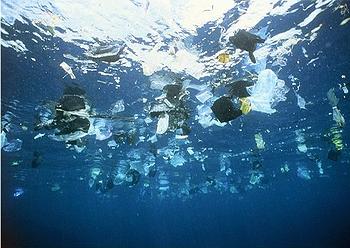
STRASBOURG, France, March 11, 2014 (ENS) – Members of the European Parliament’s Environment Committee Monday approved a report for reducing the use of single-use lightweight plastic carrier bags. The report recommends a two-stage reduction target for plastic bags across the EU’s 28 Member States.
The report advances the MEPs’ process of amending the law on packaging and waste to limit the negative impacts of plastic bags on the environment, based on a proposal by the European Commission, the executive branch of the EU government.

The goal of the amendment is to encourage waste prevention and reduce the number of lightweight plastic bags, defined as 50 microns or less in thickness, that litter European lands and waters.
Discarded plastic carrying bags pollute soil and water and kill thousands of marine animals, the MEPs observed.
The report states, “These bags tend to escape waste management streams and accumulate in the environment where they can last for hundreds of years, mostly in fragmented form. If not, they are often sent to landfill which has further negative implications for resource efficiency and pollution.”
In 2010, more than eight billion plastic bags ended up as litter in Europe.
Every European citizen used, on average, 198 plastic bags, 90 percent of which were single-use lightweight bags.
Annual per capita consumption of single-use plastic bags varies greatly among the 28 Member States.
It ranges from an estimated four plastic bags consumed per citizen in the best performing countries, Denmark and Finland, to an estimated 466 plastic bags consumed per citizen in the worst performing countries: Poland, Portugal, Slovenia, Slovakia, and the Baltic states: Estonia, Latvia and Lithuania.
Prepared by the Ex-Ante Impact Assessment Unit for the European Parliament’s Committee on Environment, Public Health and Food Safety, the report’s author, Alison Davies, analyzes four increasingly strict options:
- a base-line status quo;
- a voluntary commitment by retailers to stop distributing plastic bags;
- setting an EU-level prevention target for plastic bags, combined with fees;
- the introduction of an EU-wide ban on single-use plastic bags.
The European Commission’s preference is option 3 – the setting of an EU-level prevention target for single-use plastic carrier bags, combined with economic instruments. This is described in the report as “the common denominator of policies that have successfully reduced plastic bag consumption.”
The report recommends introducing a two-stage reduction target for plastic bags by 50 percent within three years after the proposed law enters into force, and 80 percent within five years, which would come around the year 2020.

The target is based on the EU average per capita consumption and so will mean different efforts in different Member States.
To achieve the target, Member States should ensure that, at the very least, food retailers charge for plastic bags handed out at the cash register, instead of providing them free of charge, the report advises. The exact design of such charges is left up to Member States.
MEP Gerben-Jan Gerbrandy of the Netherlands, spokesperson on this issue for the Alliance of Liberals and Democrats for Europe (ALDE) Party, said, “Although a huge environmental problem, 70 percent of all plastic waste in the North Sea comes from plastic bags, it is very easy to solve. Countries like Ireland have decreased the amount of bags used by more than 90 percent with a tiny levy. The European citizens understand the problem and are very willing to cooperate in solving it.”
Plastic bags that have a function in ensuring food hygiene, such as bags used for fresh meat and fish, are exempted from these new measures
The measure could cost some European employees their jobs. The report estimates that there are about 250 to 300 producers of plastic carrier bags in the EU, with 15,000 to 20,000 employees. Many are are family-owned small and medium enterprises, although detailed information on these companies has been difficult to obtain, the report notes, and they may not have been consulted about the legislative change.
“Given that around 70 per cent of all non-biodegradable single-use plastic carrier bags on the market are imported, mainly from Asia,” the report anticipates “limited negative impacts on European producers under options 2 and 3.”
The entire Parliament is scheduled to vote on the amendment during the April session.
Negotiations with the Council of Ministers to finalize the legislation is scheduled for the next parliamentary term.
Copyright Environment News Service (ENS) 2014. All rights reserved.
© 2014, Environment News Service. All rights reserved. Content may be quoted only with proper attribution and a direct link to the original article. Full reproduction is prohibited.
